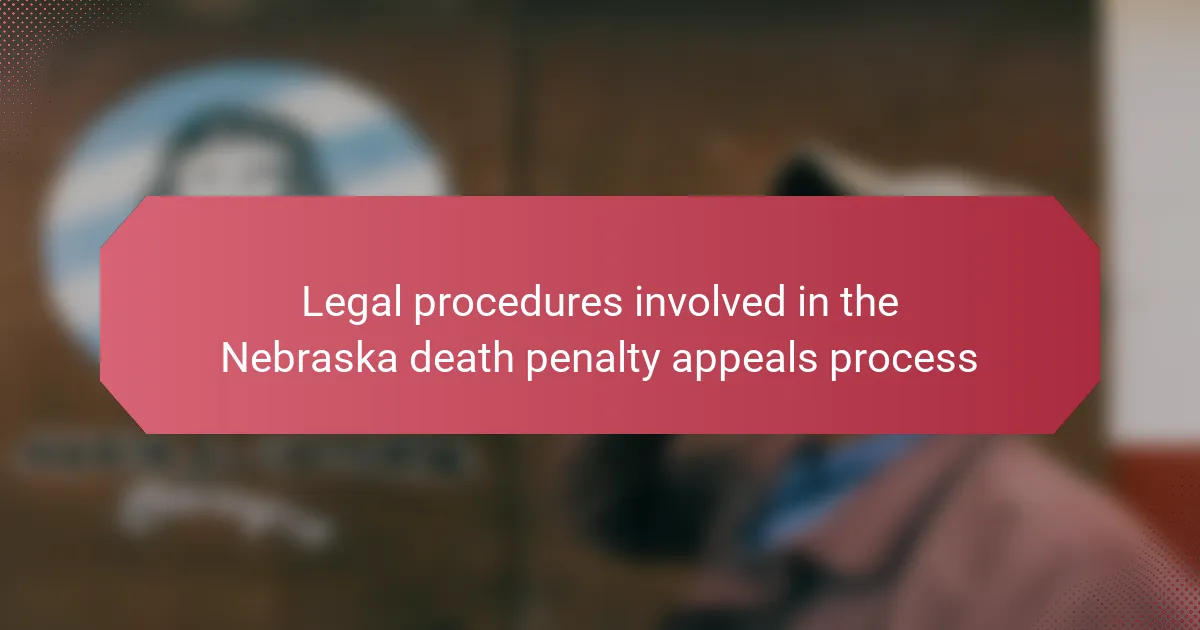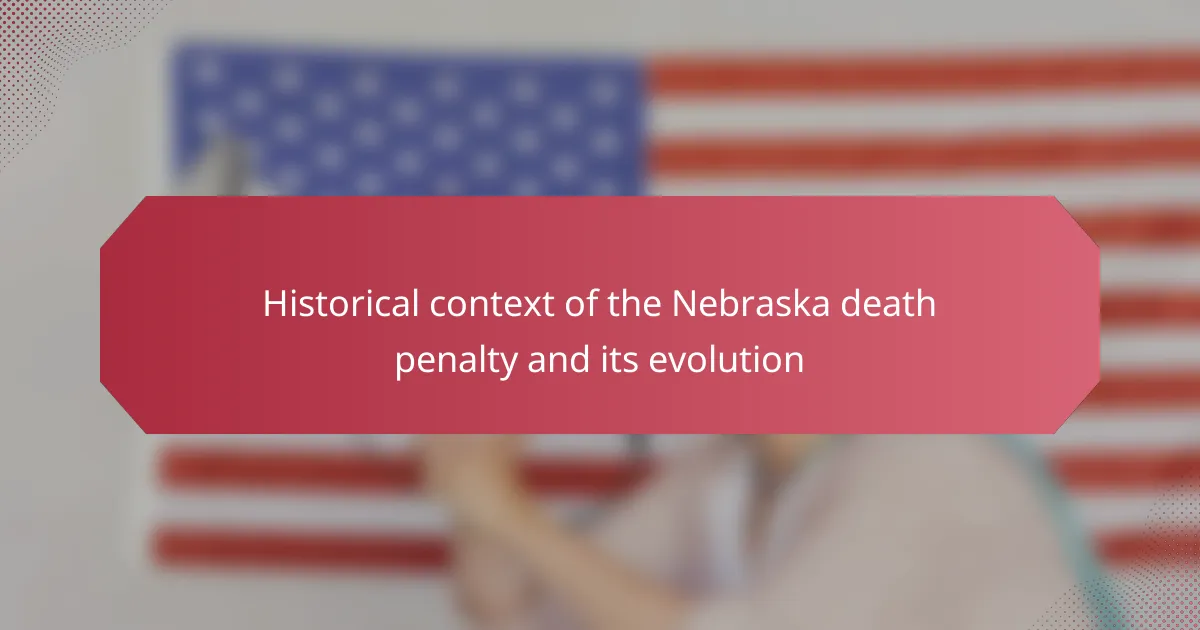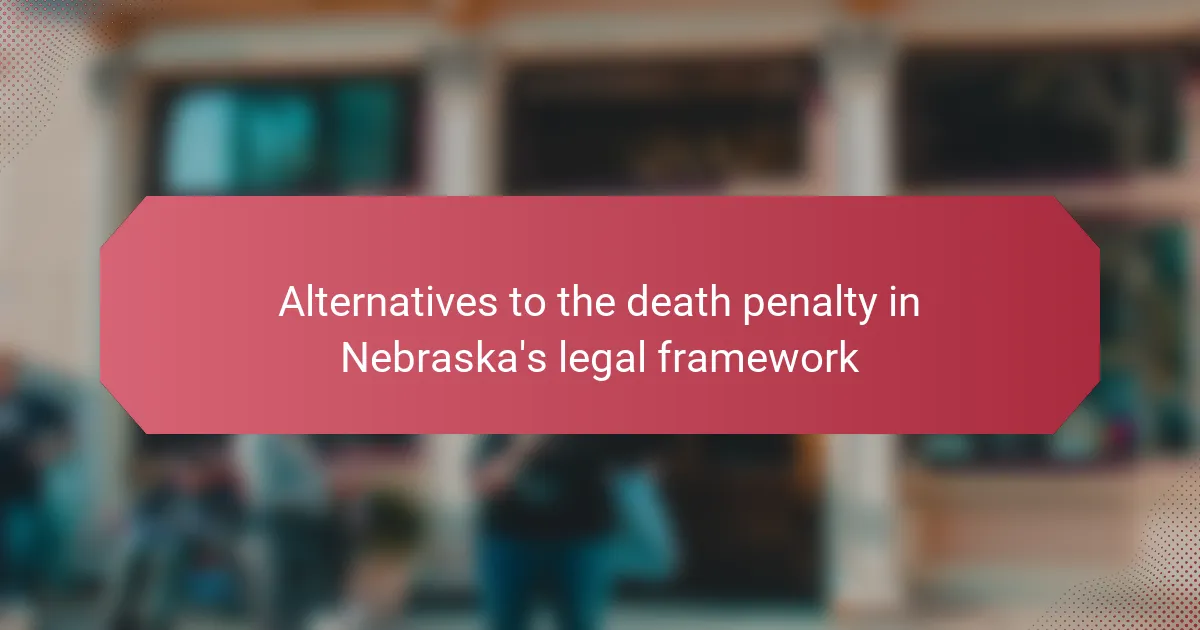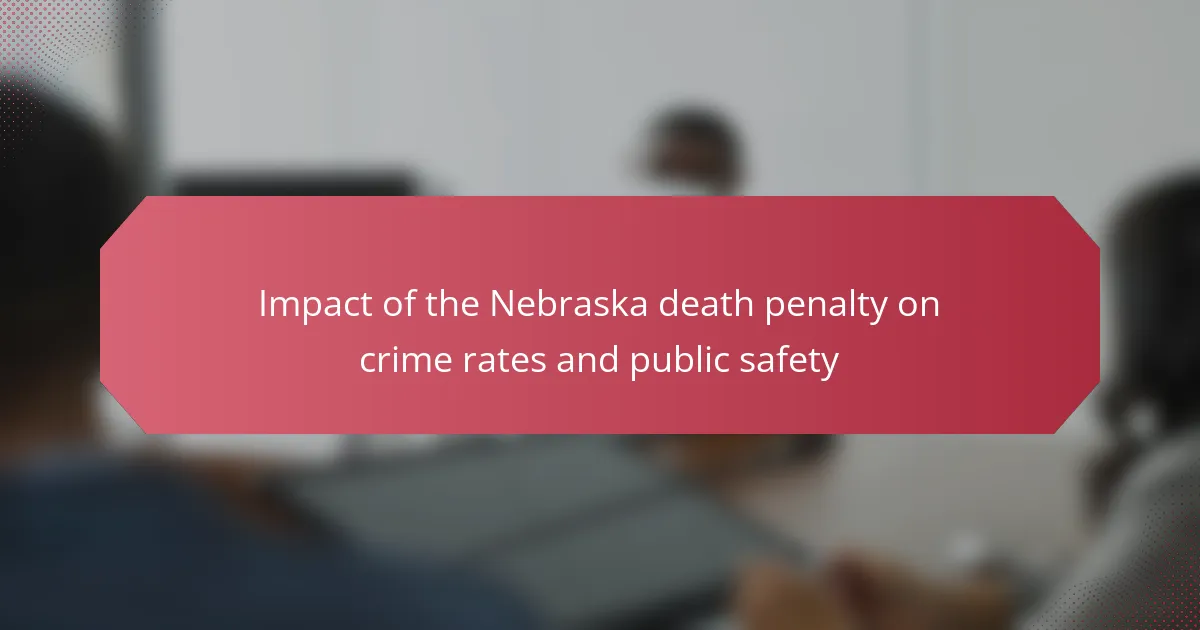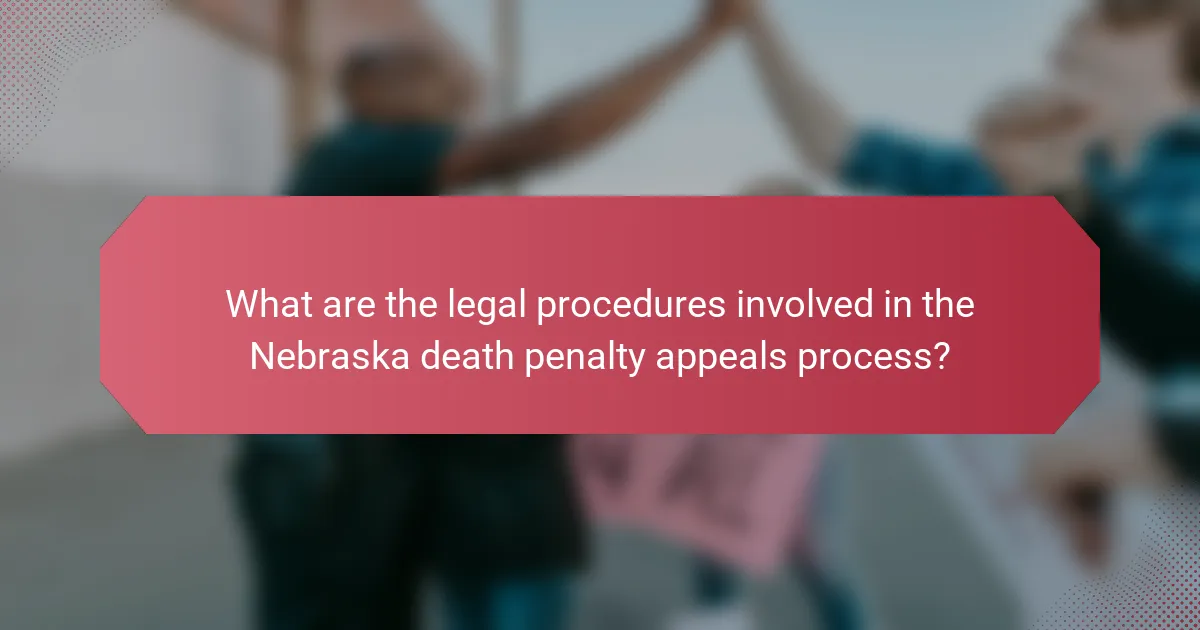
What are the legal procedures involved in the Nebraska death penalty appeals process?
The Nebraska death penalty appeals process involves several legal procedures. Initially, a defendant may file a direct appeal following a conviction and sentencing. This appeal is submitted to the Nebraska Supreme Court. The court reviews the trial record for legal errors.
If the direct appeal is denied, the defendant can pursue post-conviction relief. This involves filing a motion in the trial court. The motion claims that the conviction or sentence is unconstitutional. The trial court then holds an evidentiary hearing to evaluate the claims.
If denied, the defendant can appeal this decision to the Nebraska Supreme Court. The court’s ruling on post-conviction relief is typically final. Federal habeas corpus petitions may also be filed after state appeals are exhausted. This allows for federal review of the state court’s decision.
These procedures ensure that defendants have multiple opportunities to challenge their sentences. Each step is governed by specific rules and timelines established by Nebraska law.
How does the Nebraska death penalty appeals process begin?
The Nebraska death penalty appeals process begins with the filing of a notice of appeal. This notice must be submitted to the Nebraska Supreme Court. It typically occurs after a conviction or sentencing in a lower court. The defendant has a limited time frame to file this notice. This timeframe is usually 30 days from the date of the sentencing. Once filed, the court will schedule a briefing schedule. Both the defense and the prosecution will submit written briefs. These briefs outline the arguments for and against the appeal. The Nebraska Supreme Court will then review the case. This process ensures that all legal arguments are considered before a decision is made.
What triggers the need for an appeal in death penalty cases?
The need for an appeal in death penalty cases is triggered by legal errors during the trial. These errors can include improper jury instructions, ineffective assistance of counsel, or prosecutorial misconduct. Additionally, new evidence that may exonerate the defendant can also prompt an appeal. The appeals process allows for the review of these issues to ensure a fair trial. In Nebraska, specific grounds for appeal are outlined in state law. These grounds are critical for maintaining justice and upholding constitutional rights. Each appeal must clearly demonstrate how the identified issues affected the trial’s outcome. The goal is to rectify any injustices that may have occurred.
Who can file an appeal in the Nebraska death penalty process?
In the Nebraska death penalty process, the defendant can file an appeal. This includes individuals sentenced to death who believe their conviction or sentence is unjust. Family members or legal representatives may also initiate appeals on behalf of the defendant. The appeal can challenge various aspects, including trial errors or constitutional violations. Nebraska law allows for both direct appeals and post-conviction relief. Each appeal must adhere to specific legal procedures and timelines established by state law.
What are the stages of the Nebraska death penalty appeals process?
The stages of the Nebraska death penalty appeals process include several key steps. First, the convicted individual can file a direct appeal to the Nebraska Supreme Court. This appeal challenges the conviction and sentence based on legal errors during the trial.
If the direct appeal is unsuccessful, the next stage is post-conviction relief. This process allows the individual to argue that their constitutional rights were violated. The post-conviction motion is filed in the district court where the conviction occurred.
Following this, if the district court denies the post-conviction relief, the individual can again appeal to the Nebraska Supreme Court. This stage focuses on reviewing the district court’s decision.
If all state appeals are exhausted, the individual may seek federal habeas corpus relief. This federal process allows for a review of the state court’s decisions under federal law.
Each of these stages is critical for ensuring that legal rights are upheld throughout the appeals process.
What occurs during the initial appeal stage?
During the initial appeal stage, the convicted individual files a notice of appeal. This notice must be submitted within a specified time frame after sentencing. The appeal is then assigned to an appellate court. The court reviews the trial record for legal errors. The appellant may submit a brief outlining their arguments. The state responds with its own brief supporting the original verdict. Oral arguments may be scheduled for both parties to present their cases. The appellate court then issues a decision, which can affirm, reverse, or modify the lower court’s ruling. This process is governed by Nebraska Revised Statute § 29-2524, which outlines the appeal procedures for death penalty cases.
How does the post-conviction relief process work?
The post-conviction relief process allows individuals to challenge their convictions after the trial has concluded. This process typically begins with the filing of a motion for post-conviction relief in the appropriate court. The motion must outline specific grounds for relief, such as ineffective assistance of counsel or newly discovered evidence.
Once filed, the court will review the motion to determine if a hearing is warranted. If a hearing is granted, both parties present evidence and arguments. After the hearing, the court issues a ruling on whether to grant or deny the relief sought.
In Nebraska, this process is governed by state law, which outlines the time limits and procedural requirements for filing. The Nebraska Revised Statute 29-3001 specifically details the grounds for post-conviction relief. This legal framework ensures that individuals have a mechanism to seek justice after their initial trial has concluded.
What role does the Nebraska Supreme Court play in the appeals process?
The Nebraska Supreme Court serves as the highest appellate court in the state. It reviews decisions made by lower courts, including those related to death penalty cases. The court has the authority to affirm, reverse, or modify these decisions. Its role ensures that legal standards and constitutional rights are upheld. The Nebraska Supreme Court also provides a final avenue for appeals in capital cases. This includes reviewing evidence and legal arguments presented during the trial. The court’s rulings can significantly impact the outcome of death penalty appeals. Its decisions set legal precedents that influence future cases.
What legal standards apply during the Nebraska death penalty appeals process?
The legal standards during the Nebraska death penalty appeals process include adherence to constitutional protections and procedural rules. The Eighth Amendment prohibits cruel and unusual punishment, influencing the appeals framework. Additionally, Nebraska law mandates that death penalty cases undergo rigorous scrutiny in both state and federal courts. The standard of review often involves whether the defendant received effective legal representation. Courts assess claims of procedural errors or constitutional violations. Evidence must be evaluated under the standard of whether it could have affected the outcome of the trial. The Nebraska Supreme Court and federal courts also examine the sufficiency of the evidence supporting the death sentence. These legal standards ensure fair consideration of appeals in capital cases.
How do constitutional rights impact the appeals process?
Constitutional rights significantly impact the appeals process by ensuring fairness and due process. The Fifth and Fourteenth Amendments guarantee that no individual is deprived of life, liberty, or property without due process. These rights require that defendants have access to legal representation during appeals. Furthermore, the Eighth Amendment prohibits cruel and unusual punishment, influencing the standards for death penalty cases. Courts evaluate whether the appeals process adheres to these constitutional protections. Failure to uphold these rights can result in the reversal of convictions or sentences. Historical cases, such as Gideon v. Wainwright, underscore the importance of legal counsel in the appeals process. These constitutional guarantees shape the framework within which appeals are conducted in death penalty cases in Nebraska.
What evidentiary standards are used in Nebraska death penalty appeals?
Nebraska death penalty appeals primarily utilize the standard of “clear and convincing evidence.” This evidentiary standard is applied to claims of ineffective assistance of counsel. Additionally, Nebraska courts may require a “preponderance of the evidence” standard for various procedural claims. The burden of proof typically lies with the appellant. This means that the individual appealing must provide sufficient evidence to support their claims. Nebraska statutes and case law guide these standards. The Nebraska Supreme Court has consistently upheld these evidentiary requirements in death penalty cases.
What challenges are faced during the Nebraska death penalty appeals process?
The Nebraska death penalty appeals process faces several significant challenges. One major challenge is the lengthy duration of the appeals, which can take years or even decades. This extended timeline often results in emotional strain for the families of victims and the convicted individuals.
Another challenge is the complexity of legal procedures involved. Navigating the legal system requires expertise in criminal law, which can be a barrier for those without adequate representation. Additionally, the appeals process often involves multiple layers of review, including state and federal courts.
There is also the challenge of varying interpretations of law. Different courts may interpret similar cases differently, leading to inconsistencies in outcomes. Furthermore, there are resource limitations, as public defenders may be overburdened and underfunded. This can affect the quality of legal representation provided to defendants.
Finally, public opinion and political factors can influence the appeals process. Changes in administration or shifts in societal attitudes towards the death penalty can impact how cases are handled.
What are common legal hurdles in death penalty appeals?
Common legal hurdles in death penalty appeals include procedural errors, ineffective assistance of counsel, and new evidence claims. Procedural errors often arise from misapplication of legal standards during trial or appeal. Ineffective assistance of counsel can result from inadequate representation, impacting the appeal’s outcome. New evidence claims may face challenges in proving relevance or admissibility. Additionally, time limitations can restrict the ability to file appeals. Courts may also dismiss appeals based on failure to follow procedural rules. Each hurdle can significantly affect the chances of a successful appeal in death penalty cases.
How do delays affect the appeals process in Nebraska?
Delays can significantly impact the appeals process in Nebraska. They can prolong the duration of the appeal, leading to extended uncertainty for the defendant. This can affect mental health and legal strategy. Delays may also result from procedural issues or backlog in the court system. According to the Nebraska Supreme Court, these delays can hinder timely justice. Furthermore, prolonged appeals can increase legal costs for defendants. Overall, delays complicate the appeals process and can undermine the effectiveness of legal representation.
How does the Nebraska death penalty appeals process compare to other states?
The Nebraska death penalty appeals process is distinct from other states in its structure and timeline. Nebraska employs a post-conviction relief system that allows for appeals to be filed in state court. This process can be lengthy, often taking several years to resolve. In contrast, many states have more streamlined procedures or allow for federal habeas corpus petitions to expedite appeals.
Additionally, Nebraska’s process is influenced by the state’s unique legal framework, including its recent moratorium on executions. This contrasts with states that actively carry out death sentences, where appeals may be prioritized differently. In Nebraska, the appeals process also includes multiple levels of review, which can prolong the timeline compared to states with simpler systems.
Overall, while Nebraska’s appeals process shares similarities with other states, its unique legal context and procedural nuances create significant differences.
What are the unique aspects of Nebraska’s process compared to other states?
Nebraska’s death penalty appeals process is unique due to its single-stage appeal system. Unlike many states that have multiple levels of appeals, Nebraska consolidates the process into one primary appeal. This streamlines the judicial review but can limit the depth of scrutiny. Additionally, Nebraska requires a unanimous jury decision for death sentences, which is less common in other states. The state also allows for post-conviction relief based on newly discovered evidence, providing a distinct avenue for appeals. These characteristics create a more expedited but potentially less comprehensive review process compared to other states.
How do outcomes of appeals in Nebraska differ from those in other jurisdictions?
Outcomes of appeals in Nebraska often differ from those in other jurisdictions due to unique state laws and judicial interpretations. Nebraska’s appeals process is influenced by its specific statutes, such as the Nebraska Revised Statutes § 29-2520, which outlines the procedures for death penalty appeals. These laws may result in different timelines and procedural requirements compared to other states. For example, Nebraska allows for direct appeals to the Nebraska Supreme Court, which may expedite the process relative to jurisdictions that require multiple layers of review. Additionally, Nebraska has a history of fewer successful appeals leading to exoneration compared to states with more liberal appeal processes. This has been evidenced by statistical data showing a lower rate of death penalty reversals in Nebraska.
What resources are available for navigating the Nebraska death penalty appeals process?
Resources for navigating the Nebraska death penalty appeals process include legal aid organizations, state government websites, and law libraries. Legal aid organizations provide assistance to individuals facing appeals. The Nebraska Commission on Public Advocacy offers resources and support for defendants. The Nebraska Supreme Court’s website contains procedural information and forms related to appeals. Additionally, law libraries in Nebraska provide access to legal texts and research materials. These resources are essential for understanding the complexities of the appeals process and ensuring proper representation.
What legal assistance is available for defendants in death penalty cases?
Defendants in death penalty cases have access to various legal assistance options. These include public defenders, private attorneys, and specialized death penalty defense teams. Public defenders are appointed for those who cannot afford legal representation. Private attorneys can be hired by defendants who have the financial means. Specialized death penalty defense teams often consist of experienced lawyers with expertise in capital cases.
Additionally, organizations such as the Innocence Project provide support and resources. Legal aid societies also offer assistance in navigating the appeals process. These resources are crucial, as the complexity of death penalty cases requires skilled legal representation. Studies indicate that effective legal assistance significantly impacts case outcomes in capital trials.
How can individuals stay informed about changes in the appeals process?
Individuals can stay informed about changes in the appeals process by regularly checking official state resources. These resources include the Nebraska Department of Correctional Services website. They provide updates on legal procedures and policy changes. Following legal news outlets can also offer timely information. Subscribing to newsletters from legal advocacy groups is beneficial. These groups often share insights on appeals process developments. Attending public forums or legal workshops can enhance understanding. Engaging with legal professionals can provide personalized updates and guidance.
What best practices should be followed in the Nebraska death penalty appeals process?
Best practices in the Nebraska death penalty appeals process include thorough legal representation and timely filing of appeals. Legal representation must be experienced in death penalty cases. This ensures that all potential issues are identified and addressed. Timely filing is crucial because it adheres to statutory deadlines. Additionally, comprehensive documentation of trial records is essential. This allows for effective review and argumentation in appeals. Engaging expert witnesses can strengthen the case, especially regarding mental health or forensic evidence. Lastly, maintaining clear communication with the client is vital throughout the process. These practices help ensure a fair and just appeals process.
How can defendants effectively prepare for their appeals?
Defendants can effectively prepare for their appeals by gathering all relevant case documents. This includes trial transcripts, evidence, and legal briefs. They should also consult with experienced appellate attorneys. These attorneys can provide insights into potential grounds for appeal. Defendants must identify specific legal errors made during the trial. This may involve reviewing jury instructions or evidentiary rulings. Additionally, they should collect supporting evidence for their claims. This can strengthen their argument for an appeal. Thorough preparation increases the chances of a successful outcome in the appeals process.
What strategies can lawyers employ to enhance the chances of a successful appeal?
Lawyers can enhance the chances of a successful appeal by thoroughly researching case law. They should identify precedents that support their arguments. Crafting a compelling legal brief is essential. This brief must clearly outline the legal errors made during the trial. Lawyers should also focus on gathering new evidence. This evidence can significantly impact the appeal’s outcome. Engaging expert witnesses can strengthen the case. Their testimony may provide crucial insights that support the appeal. Additionally, maintaining clear communication with clients is vital. This ensures that clients understand the process and can provide necessary information. Establishing a strong narrative around the case can also be beneficial. A well-structured argument can resonate more with appellate judges.
The main entity of this article is the Nebraska death penalty appeals process, which encompasses the legal procedures available for defendants sentenced to death. The article outlines the various stages of this process, including direct appeals, post-conviction relief, and federal habeas corpus petitions, detailing the specific legal standards and requirements involved at each stage. It also discusses the challenges faced during the appeals process, such as procedural errors and delays, while highlighting the role of the Nebraska Supreme Court and the importance of constitutional rights. Additionally, the article provides insights into the resources available for defendants and best practices for effective appeal preparation.
